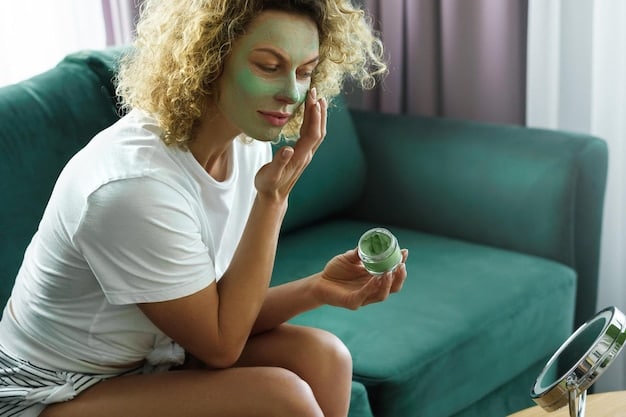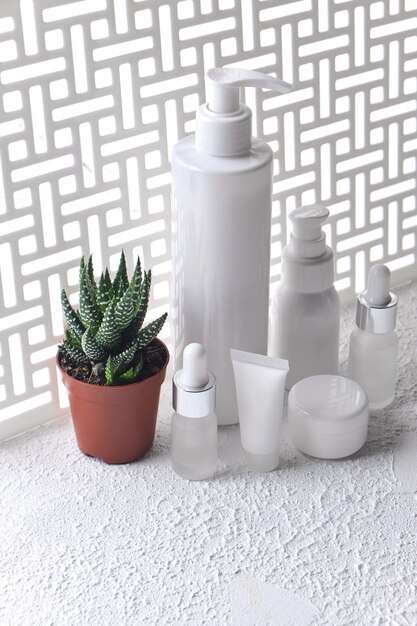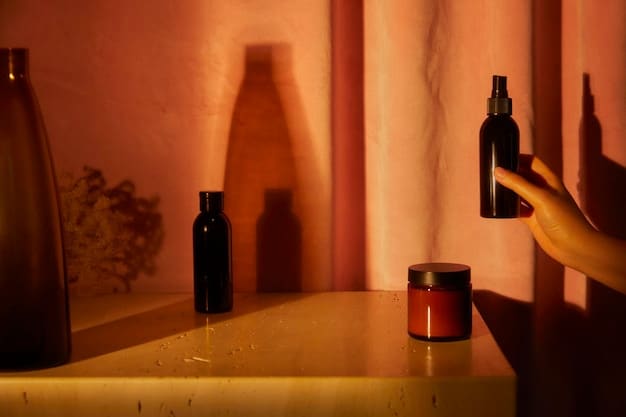Nighttime Skincare Routine: Maximize Repair While You Sleep

Anúncios
A well-structured nighttime skincare routine is crucial for maximizing skin repair and rejuvenation, leveraging the body’s natural regenerative processes during slumber to address concerns like aging, hydration, and epidermal defense, offering profound benefits beyond mere cleansing and superficial treatment.
As the day concludes, our bodies transition into a period of rest and repair, a phenomenon equally true for our skin. A dedicated nighttime skincare routine: maximize repair and rejuvenation while you sleep involves more than just cleansing; it’s a strategic approach to support the skin’s natural nightly recuperation, leading to a healthier, more radiant complexion.
Anúncios
The Science of Sleep and Skin Repair
Understanding the intricate relationship between restful sleep and skin health is fundamental to appreciating the value of a nighttime skincare routine. Our bodies, including our largest organ—the skin—enter a crucial repair phase during sleep.
This period, often overlooked in the daily hustle, is when cellular regeneration peaks, DNA repair mechanisms are activated, and the skin works diligently to undo the damage accumulated throughout the day from environmental stressors such as UV radiation and pollution. Melatonin, the sleep hormone, also plays a role as an antioxidant, combating free radicals.
Circadian Rhythms and Skin Health
The skin operates on its own circadian rhythm, a 24-hour cycle influencing various biological processes. At night, while we sleep, skin permeability increases, which means products applied during this time can potentially penetrate more effectively. Blood flow to the skin also surges, delivering vital nutrients and oxygen, aiding in the repair and renewal processes.
Anúncios
- Increased cellular regeneration and turnover occur, replacing damaged skin cells.
- DNA repair mechanisms are more active, correcting cellular damage from oxidative stress.
- Melatonin production in the skin offers direct antioxidant benefits, neutralizing free radicals.
- Skin barrier function is typically more permeable, enhancing product absorption.
Consequently, neglecting a proper evening regimen is akin to missing a prime opportunity to bolster the skin’s natural defenses and regenerative capabilities. This vital connection highlights why targeted treatments before bed can yield profound and visible results over time.
Impact of Sleep Deprivation on Skin
Conversely, inconsistent or insufficient sleep can disrupt these vital processes, leading to visible signs of fatigue and accelerated aging. Studies link chronic sleep deprivation to increased inflammation, impaired skin barrier function, and reduced collagen production. This can manifest as dullness, increased fine lines, dark circles, and a general lack of vibrancy, undermining even the best daytime efforts.
Therefore, a consistent sleep schedule, paired with a well-formulated skincare routine, creates a synergistic effect, maximizing the skin’s ability to heal and rejuvenate, ensuring you wake up to a refreshed and healthier complexion.
In essence, sleep is not just about resting; it’s an active period of renewal for the skin, and a thoughtful nighttime routine serves as the catalyst for optimizing this natural process.
Building Your Essential Nighttime Skincare Routine
Crafting an effective nighttime skincare routine requires a structured approach, focusing on cleansing, treating, and protecting. This multi-step process ensures your skin receives optimal care, preparing it for the intense repair and rejuvenation cycles that occur overnight.
Step 1: Double Cleansing for Purity
The foundation of any good nighttime routine is thorough cleansing. Double cleansing, a technique originating from Korean skincare, involves using two different types of cleansers to remove impurities effectively.
- First cleanse (oil-based): Use an oil-based cleanser, balm, or micellar water to dissolve makeup, sunscreen, and excess sebum. This step is crucial for breaking down oil-soluble impurities that water-based cleansers might miss.
- Second cleanse (water-based): Follow with a gentle, water-based cleanser to remove any remaining residue and cleanse the skin itself. This leaves your skin impeccably clean and ready to absorb subsequent treatments.
This dual approach ensures all traces of the day’s environmental aggressors, makeup, and SPF are completely lifted, preventing clogged pores and allowing active ingredients to penetrate more effectively. Choose formulations that are gentle and do not strip the skin’s natural moisture barrier.

Step 2: Treat with Targeted Serums and Treatments
After cleansing, the skin is primed to receive targeted treatments. This is where you address specific concerns such as aging, hyperpigmentation, acne, or sensitivity.
Serums, being lightweight and highly concentrated with active ingredients, are best applied at this stage. Common nighttime heroes include:
- Retinoids (Vitamin A derivatives): Known for their powerful anti-aging properties, retinoids (such as retinol, retinaldehyde, or tretinoin) accelerate cell turnover, reduce fine lines and wrinkles, and improve skin texture. Introduce them slowly to minimize irritation.
- Antioxidant serums (e.g., Vitamin C, Niacinamide): While Vitamin C is often used in the morning for UV protection, some formulations can be beneficial at night for their collagen-boosting and brightening effects. Niacinamide also helps with barrier function and reducing inflammation.
- Peptide serums: These help stimulate collagen production and improve skin elasticity, supporting the skin’s structural integrity.
- Hydrating serums (e.g., Hyaluronic Acid): Although often associated with daytime use, layering a hydrating serum before your moisturizer at night can provide an extra boost of moisture, especially in drier climates or for dehydrated skin types.
Apply these treatments on a slightly damp face (after cleansing and ideally after a hydrating toner, if you use one) to enhance absorption. Allow each layer to absorb for a minute or two before moving to the next.
Step 3: Moisturize and Seal
The final crucial step is to lock in all the goodness with a rich, nourishing moisturizer. Night creams are typically thicker and contain a higher concentration of emollient and occlusive ingredients compared to daytime moisturizers.
Their role is to:
- Replenish lost moisture, preventing transepidermal water loss (TEWL) overnight.
- Support the skin barrier, which can be more vulnerable during the night.
- Deliver additional active ingredients that work best over extended periods.
Look for ingredients like ceramides, fatty acids, cholesterol, squalane, and shea butter in your night cream, as these mimic the skin’s natural lipid barrier and provide profound hydration and protection. For those with oily or acne-prone skin, a gel-cream or oil-free moisturizer might be more suitable, ensuring it still provides adequate hydration without clogging pores.
Around the delicate eye area, a specific eye cream designed to address concerns like fine lines, puffiness, or dark circles should be gently patted in. The skin around the eyes is thinner and more susceptible to signs of aging and fatigue, warranting targeted care.
By diligently following these steps, you create an optimal environment for your skin to repair, regenerate, and emerge revitalized each morning. Consistency is key, and over time, these simple yet powerful habits will yield remarkable improvements in your skin’s health and appearance.
Key Ingredients for Overnight Repair and Rejuvenation
Choosing the right ingredients for your nighttime routine is paramount, as they directly influence the efficacy of your skin’s nocturnal repair and rejuvenation processes. Certain compounds are uniquely suited to work their magic while you sleep, offering profound benefits.
Retinoids: The Gold Standard for Anti-Aging
Retinoids, including retinol, retinaldehyde, and topical tretinoin (prescription only), are vitamin A derivatives renowned for their unparalleled ability to stimulate collagen production and accelerate cell turnover. When applied at night, they work to:
- Reduce the appearance of fine lines and wrinkles.
- Improve skin texture and tone.
- Minimize hyperpigmentation and sun damage.
- Help clear acne by preventing clogged pores.
Because retinoids can increase photosensitivity and may cause initial irritation (redness, flaking), nighttime application is ideal, allowing the skin to adapt without immediate sun exposure. Start with a lower concentration and gradually increase frequency as your skin tolerates it.
Peptides: Building Blocks for Stronger Skin
Peptides are short chains of amino acids, the fundamental building blocks of proteins like collagen and elastin. Incorporating peptide-rich serums or creams into your nighttime routine can signal the skin to produce more of these vital proteins, leading to:
- Improved skin firmness and elasticity.
- Reduced appearance of wrinkles.
- Enhanced skin repair and regeneration.
They work synergistically with other ingredients and are generally well-tolerated, making them an excellent addition for almost all skin types seeking anti-aging benefits and overall skin rejuvenation.
Antioxidants: Fighting Free Radical Damage
While often highlighted for daytime protection against environmental aggressors, certain antioxidants also play a critical role in nighttime repair. Ingredients like Resveratrol, CoQ10, and specific forms of Vitamin C (such as magnesium ascorbyl phosphate or tetrahexyldecyl ascorbate, which are more stable) help neutralize free radicals that may have formed during the day’s exposure to pollution and UV light, but also support cellular repair.
- Resveratrol: A potent antioxidant found in grapes and berries, it helps protect against environmental damage and promotes cellular longevity.
- CoQ10: Naturally present in the skin, CoQ10 levels decline with age. Topical application aids in cellular energy production and antioxidant defense.
These ingredients help to calm the skin, reduce inflammation, and support healthy cellular function, which is crucial during the restorative hours of sleep.
Hydrators and Emollients: Barrier Support
Ingredients that focus on hydration and barrier support are non-negotiable for any nighttime routine. Ceramides, Hyaluronic Acid, Squalane, and Glycerin work in concert to strengthen the skin’s natural moisture barrier, preventing moisture loss and maintaining suppleness.
- Hyaluronic Acid: A humectant that attracts and holds up to 1000 times its weight in water, providing intense hydration.
- Ceramides: Lipids naturally found in the skin barrier, essential for maintaining its integrity and preventing moisture loss.
- Squalane: A highly emollient lipid that mimics the skin’s natural oils, offering deep hydration without feeling heavy or clogging pores.
These ingredients are vital for ensuring the skin remains plump, hydrated, and resilient throughout the night, complementing the work of more active treatment ingredients and safeguarding the skin’s delicate ecosystem.
By thoughtfully incorporating these science-backed ingredients into your nighttime routine, you empower your skin to perform its natural repair functions at peak efficiency, leading to visible improvements in texture, tone, and overall health over time.
The Importance of Consistency and Patience
While the excitement of immediate results is tempting, achieving significant skin improvement through a nighttime routine is primarily a marathon, not a sprint. Consistency and patience are the two most undervalued, yet crucial, components of any effective skincare regimen. The skin’s natural regeneration cycle is a continuous process, and its visible benefits accumulate over time.
Understanding Skin Cell Turnover
The average skin cell turnover cycle is approximately 28 days for young adults, but this slows down with age, reaching up to 40-60 days or more in older individuals. This means that it takes at least a month, and often longer, for new, healthier skin cells to reach the surface. Ingredients like retinoids, which accelerate this process, still require weeks or months to show their full potential.
Expecting overnight miracles can lead to frustration and prematurely abandoning a routine that could otherwise deliver excellent results. Commit to at least 4-6 weeks of consistent use before evaluating the effectiveness of a new product or entire routine. For conditions like severe acne, hyperpigmentation, or fine lines, visible improvements might take several months.
Building a Habit
Establishing a nightly ritual contributes significantly to its success. Just like brushing your teeth, making your skincare routine a non-negotiable part of your bedtime ritual enhances adherence. This consistency ensures your skin is continuously receiving the benefits of your chosen products, allowing active ingredients to work their magic without interruption.
- Set a specific time each evening for your routine to foster regularity.
- Keep products easily accessible and organized to remove friction.
- Remind yourself of the long-term benefits to stay motivated.
The cumulative effect of consistent care leads to lasting improvements in skin health, texture, and appearance. Skipping nights or alternating products too frequently can interrupt the skin’s adaptation process to new ingredients, hindering progress.
Managing Expectations and Adjusting Your Routine
It’s important to have realistic expectations. Skincare products are designed to improve skin conditions, not necessarily to provide a complete transformation. Progress is often gradual and subtle. Keep a mental or physical note of your skin’s condition when you start, and revisit it periodically to track improvements.
As your skin adapts and concerns evolve, your routine may need adjustments. For example, if you introduce a strong active ingredient like a retinoid, you might need to adjust the frequency of other exfoliating products. Listen to your skin: if you experience excessive dryness, irritation, or breakouts, it might be a sign to scale back or introduce products more slowly.
In essence, patience allows your skin the necessary time to respond and regenerate, while consistency ensures these benefits are continuously built upon, leading to a healthier, more resilient complexion over the long run.
Common Mistakes to Avoid in Your Nighttime Routine
While the pursuit of perfect skin leads to enthusiastic adoption of elaborate routines, several common pitfalls can inadvertently undermine your efforts. Recognizing and avoiding these mistakes is crucial for maximizing the efficacy of your nighttime regimen and preventing unnecessary skin concerns.
Over-Exfoliation
Exfoliation is beneficial for removing dead skin cells and promoting cell turnover, but overdoing it can severely compromise the skin barrier. Excessive use of physical scrubs or chemical exfoliants (AHAs, BHAs) can lead to:
- Increased sensitivity and redness.
- Compromised skin barrier, making skin more susceptible to environmental damage.
- Dehydration and excessive dryness.
- Ultimately, even more breakouts as the skin becomes irritated and inflamed.
Limit exfoliation to 2-3 times a week, depending on your skin type and the strength of the product. Pay attention to how your skin reacts and adjust accordingly. If using a retinoid, reduce exfoliation frequency or choose gentler formulations, as retinoids already promote cell turnover.

Not Cleansing Thoroughly
Failing to properly cleanse your face is perhaps one of the most critical errors. Makeup, sunscreen, dirt, and pollution accumulate on the skin throughout the day. If not completely removed, these impurities can:
- Clog pores, leading to blackheads, whiteheads, and acne.
- Prevent active ingredients applied later from effectively penetrating the skin.
- Contribute to oxidative stress and premature aging.
Even if you don’t wear makeup, a nightly cleanse is essential to remove environmental debris. As discussed, double cleansing is highly recommended to ensure all oil-based and water-based impurities are completely removed, leaving a clean canvas for your treatment products.
Using Ingredients in the Wrong Order
The order in which you apply your skincare products matters significantly because it dictates how effectively each product can penetrate and deliver its benefits. Generally, products should be applied from thinnest to thickest consistency, allowing lighter, molecularly smaller ingredients to absorb first.
- Common incorrect order: Applying a thick moisturizer before a targeted serum. The moisturizer creates a barrier that prevents the serum from penetrating.
The correct general order is: Cleanser > Toner (if used) > Serum/Treatment > Eye Cream > Moisturizer. This sequence ensures active ingredients reach the skin first, followed by products that seal in moisture and protect the skin barrier.
Forgetting Neck and Décolletage
The face often gets all the attention, but the skin on the neck and décolletage is equally delicate and prone to showing signs of aging. Neglecting these areas can lead to a noticeable disparity in skin texture and tone over time.
Extend your cleansing, serum, and moisturizing steps down to your neck and upper chest. These areas are just as exposed to environmental factors as your face and will benefit immensely from consistent care, helping to maintain a more uniform and youthful appearance across your upper body.
By being mindful of these common mistakes, you can refine your nighttime skincare routine, ensuring that your efforts truly contribute to healthier, more radiant skin without inadvertently causing harm or diminishing product efficacy.
Customizing Your Routine for Specific Skin Concerns
While the foundational steps of a nighttime routine remain consistent, the true power lies in customizing it to address your unique skin concerns. Tailoring product choices to target specific issues ensures a more effective and personalized approach to overnight repair and rejuvenation.
For Aging Skin Concerns (Fine Lines, Wrinkles, Loss of Firmness)
The nighttime period is prime for anti-aging treatments due to increased cellular regeneration. Focus on ingredients that stimulate collagen and elastin production and improve cell turnover.
- Retinoids: These are non-negotiable. Start with a gentle retinol (0.25%-0.5%) and gradually increase strength or frequency as tolerated. They are proven to reduce fine lines, wrinkles, and improve skin texture.
- Peptides: Incorporate serums rich in signaling peptides (e.g., matrixyl, argireline) to encourage the skin to produce more collagen and elastin. They can be layered with retinoids.
- Growth Factors: These biomimetic proteins can enhance cellular repair and regeneration, making them excellent for overall skin rejuvenation and firmness.
- Rich Moisturizers: Use a deeply hydrating and occlusive night cream containing ceramides, fatty acids, and squalane to support the skin barrier, especially important when using active anti-aging ingredients that can cause dryness.
Consistency is paramount. Visible results will take time, but the cumulative effect of these ingredients will significantly improve skin elasticity and reduce the signs of aging.
For Acne-Prone and Oily Skin
Nighttime offers an opportunity to calm inflammation, reduce breakouts, and manage oil production without the interference of daytime makeup or sunscreens. Focus on gentle yet effective treatments.
- Salicylic Acid (BHA): Use a BHA-based cleanser or a leave-on serum a few nights a week. Salicylic acid is oil-soluble, allowing it to penetrate pores, dissolve sebum, and exfoliate from within, preventing clogs.
- Benzoyl Peroxide: For more stubborn acne, a low concentration (2.5%-5%) benzoyl peroxide spot treatment or short-contact therapy can be used to kill acne-causing bacteria.
- Niacinamide: A versatile ingredient that helps reduce inflammation, minimize redness, improve barrier function, and regulate sebum production. Incorporate a niacinamide serum.
- Retinoids: Prescription retinoids (tretinoin, adapalene) are highly effective for treating and preventing acne by normalizing cell turnover and reducing inflammation. Over-the-counter retinol can also be beneficial.
- Lightweight Hydration: Even oily skin needs hydration. Choose a gel-cream or oil-free moisturizer to prevent dryness and maintain a healthy skin barrier without adding excess oil.
Avoid harsh scrubs or drying alcohols that can strip the skin and trigger more oil production.
For Dry and Dehydrated Skin
The goal for dry skin at night is to replenish moisture, repair the skin barrier, and prevent transepidermal water loss (TEWL) that can occur overnight.
- Hydrating Cleansers: Use a cream-based or oil-based cleanser that cleanses without stripping natural oils.
- Hyaluronic Acid Serum: Layer a hyaluronic acid serum onto damp skin immediately after cleansing to bind moisture to the skin.
- Ceramide-Rich Moisturizer: This is your best friend. Ceramides are essential lipids in the skin barrier that help retain moisture. A thick, occlusive night cream with ceramides, cholesterol, and fatty acids will fortify the barrier.
- Occlusives: Consider adding a thin layer of an occlusive balm (e.g., petroleum jelly or a heavy plant-based oil like jojoba or squalane) over your moisturizer in very dry areas to create a protective seal and lock in hydration. This technique is often called “slugging.”
- Humidifier: Using a humidifier in your bedroom can also help combat dry air, especially during winter months or in arid climates.
Avoid harsh exfoliating acids or excessive use of retinoids if your skin is particularly sensitive and dry, or introduce them very slowly with plenty of moisturizer.
By thoughtfully assessing your skin’s needs and selecting ingredients that directly address them, your nighttime skincare routine transforms from a basic regimen into a targeted treatment plan, optimizing your skin’s ability to repair and rejuvenate while you sleep.
Beyond Products: Lifestyle Factors Enhancing Nighttime Repair
While a meticulously crafted skincare routine is essential, its efficacy is significantly boosted by incorporating holistic lifestyle factors that support the body’s natural regenerative processes. True skin rejuvenation isn’t just about what you apply topically, but also about how you live.
Adequate and Quality Sleep
The most direct link between lifestyle and nighttime skin repair is, unsurprisingly, sleep itself. Consistent, high-quality sleep is when the skin’s renewal mechanisms are at their peak. Aim for 7-9 hours of uninterrupted sleep each night.
- Melatonin and Growth Hormone: During deep sleep, the body releases growth hormone, which fuels cell regeneration, and melatonin, a powerful antioxidant. These are critical for repairing daily skin damage.
- Reduced Cortisol: Chronic sleep deprivation elevates cortisol levels, the stress hormone, which can lead to inflammation, collagen breakdown, and impaired barrier function. Sufficient sleep helps keep cortisol in check.
Establishing a regular sleep schedule, creating a dark and cool sleep environment, and avoiding screens before bed can significantly improve sleep quality, directly benefiting your skin.
Hydration from Within
Topical hydration is crucial, but internal hydration is equally vital. Dehydration can lead to dull, less elastic skin and can exacerbate the appearance of fine lines. Drinking sufficient water throughout the day ensures your body, and consequently your skin, has the necessary fluids for optimal function.
- Aim for at least eight glasses of water daily, more if you are active or in a hot climate.
- Consider adding hydrating foods like fruits and vegetables to your diet.
Well-hydrated cells are more efficient at carrying out repair processes and maintaining a healthy skin barrier, making your skincare products work more effectively.
Balanced Nutrition
Your diet directly impacts your skin’s health and its ability to repair. A diet rich in antioxidants, healthy fats, and essential vitamins and minerals provides the internal building blocks for vibrant skin.
- Antioxidants: Berries, leafy greens, and colorful vegetables combat oxidative stress from free radicals.
- Healthy Fats: Omega-3 fatty acids from fish, flaxseeds, and walnuts help maintain skin barrier integrity and reduce inflammation.
- Proteins: Adequate protein intake provides the amino acids necessary for collagen and elastin production.
- Vitamins and Minerals: Vitamin C (for collagen synthesis), Vitamin E (antioxidant), Zinc (wound healing), and Selenium (antioxidant) are particularly beneficial.
Conversely, a diet high in processed foods, sugar, and unhealthy fats can lead to inflammation and contribute to skin issues, counteracting the benefits of your nighttime routine.
Stress Management
Chronic stress triggers the release of hormones like cortisol, which can disrupt the skin’s barrier function, promote inflammation, and accelerate aging. Managing stress is integral to healthy skin.
- Incorporate stress-reducing activities like meditation, yoga, deep breathing exercises, or spending time in nature.
- Ensure you have sufficient downtime and engage in hobbies that bring you joy.
By reducing stress levels, you allow your skin to focus more energy on repair and regeneration rather than fighting inflammatory responses, enhancing the benefits of your nightly regimen.
By integrating these lifestyle factors, you create a harmonious environment where your internal well-being and external skincare efforts converge, empowering your skin to maximize repair and rejuvenation while you sleep, leading to a radiant, healthy complexion. These habits are foundational to achieving and maintaining optimal skin health long-term.
| Key Aspect | Brief Description |
|---|---|
| 🌙 Deep Cleanse | Thoroughly remove makeup, SPF, and impurities with a double cleanse to prepare skin for treatment. |
| 🧪 Targeted Treatments | Apply serums with active ingredients like retinoids, peptides, or antioxidants to address specific concerns. |
| 💧 Barrier Support | Lock in moisture with a rich moisturizer containing ceramides or hyaluronic acid to seal benefits and prevent water loss. |
| 😴 Quality Sleep | Prioritize adequate sleep (7-9 hours) to align with the skin’s natural highest repair phase, enhancing results. |
Frequently Asked Questions About Nighttime Skincare
While daytime routines focus on protection from environmental aggressors, nighttime is when your skin naturally shifts into repair and regeneration. Cellular turnover is more active, and absorption of active ingredients is often optimized, allowing potent treatments to work more effectively without fighting against UV rays or pollution.
Yes, some forms of Vitamin C, particularly more stable derivatives like magnesium ascorbyl phosphate or tetrahexyldecyl ascorbate, can be beneficial at night. They aid in collagen production and provide antioxidant benefits, helping with skin repair. However, pure L-ascorbic acid is often preferred in the morning for its immediate antioxidant protection against daily stressors.
When starting, begin with 2-3 times a week to allow your skin to adapt, then gradually increase frequency to every other night or nightly as tolerated. Consistency is key, but avoiding irritation is paramount. If you experience dryness or flaking, reduce usage and ensure adequate hydration.
Double cleansing is highly recommended, especially if you wear makeup, sunscreen, or live in a polluted environment. The first oil-based cleanse removes oil-soluble impurities, while the second water-based cleanse washes away water-soluble debris. This ensures a thoroughly clean canvas, allowing subsequent products to penetrate better and preventing clogged pores.
“Slugging” involves applying a thin layer of an occlusive product, like petroleum jelly, as the last step of your nighttime routine to prevent transepidermal water loss. It can be beneficial for extremely dry or compromised skin barriers by sealing in moisture and enhancing product absorption. However, it might be too heavy for oily or acne-prone skin.
Conclusion
Embracing a comprehensive nighttime skincare routine is more than a beauty ritual; it’s an investment in your skin’s long-term health and vitality. By aligning your regimen with the skin’s natural reparative cycle during sleep, you empower it to address daily damage, facilitate cellular renewal, and absorb beneficial ingredients more effectively. Consistency, patience, and smart product selection are paramount. This diligent nightly effort ensures you wake up to a complexion that is not only visibly refreshed but also fundamentally healthier, reflecting the profound benefits of maximized repair and rejuvenation achieved while you sleep.





